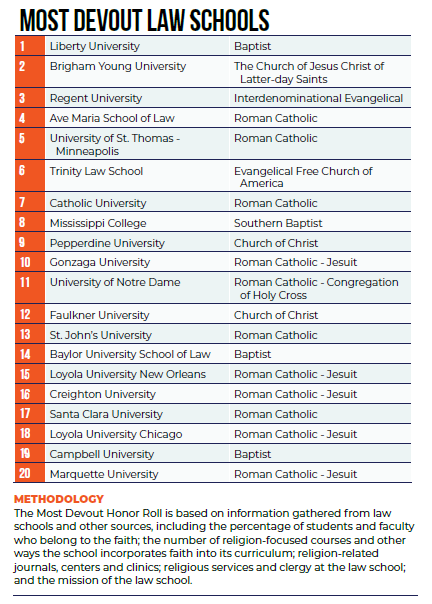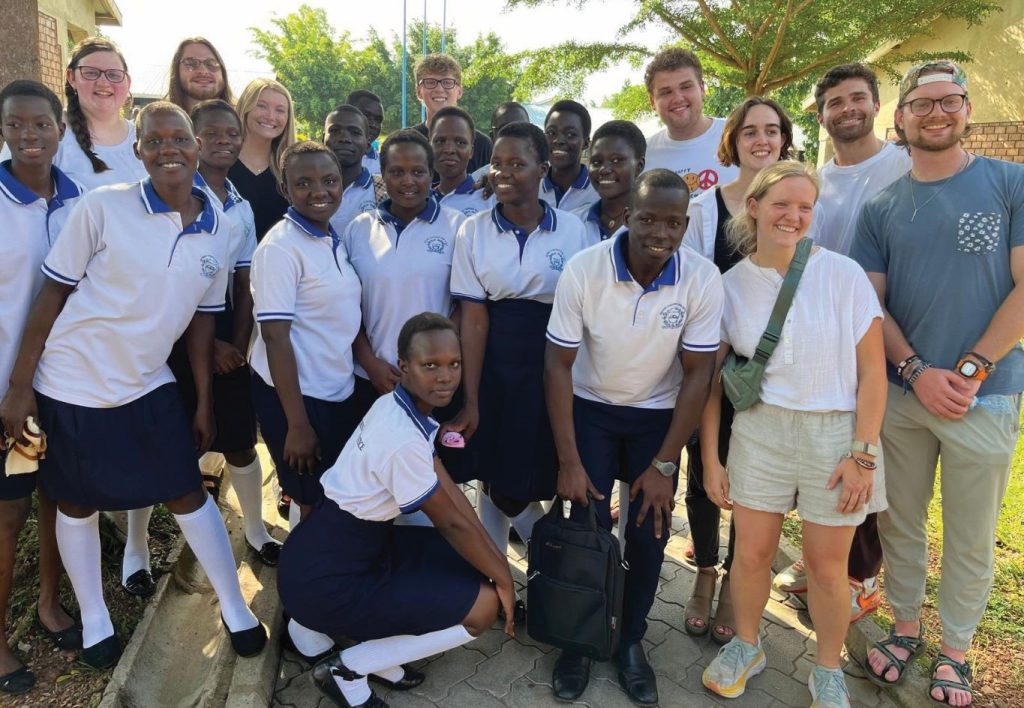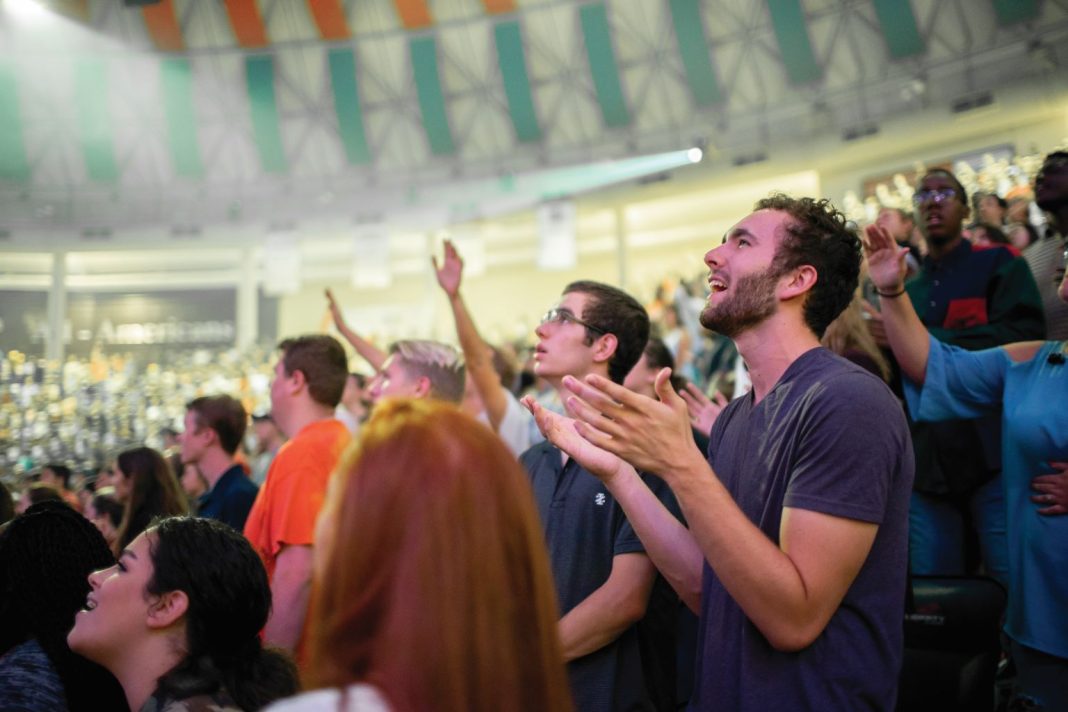We recognize 20 law schools that are living their missions through benevolent works.
Acts of service: a love language that involves doing things to make life easier or more enjoyable for someone else.
From sending cards to people in nursing homes, delivering meals to the elderly, sorting donated clothes or establishing food banks to providing law clinics that help with religious liberty issues, law schools are living their missions through various acts of service.
One example is Faulkner University, Thomas Goode Jones School of Law and its student organizations that serve the community. One such organization, the Jones Public Interest Foundation, works with food pantries and other groups to help disenfranchised individuals and those in need.
Robert Broom, a recent graduate of Faulkner Law, participated in the school’s Meals on Wheels program.
Faulkner University has two low-income elder facilities on campus. Students deliver meals to the residents, who otherwise might not see many, if any, other people during the day.
“Getting to know these people and hear their stories became a highlight of my week, as I know it is for the many students who help in this program,” Broom said. “Faulkner Law’s guiding principle is to help seek justice through serving our community and, as the prophet Isaiah said, ‘Pleading the widow’s cause.’ I saw students fulfilling this mission each day at Faulkner and strove to do my part in helping others.”
Every two years, preLaw magazine spotlights the country’s most devout law schools. Schools are ranked all together, rather than being categorized by denomination. Faulkner Law ranked 12th among the schools recognized for their devoutness.
The schools are ranked by how much emphasis they place on religion in their curriculum, faculty and daily campus life.
While 46 of the nation’s 197 law schools have ties to various religious organizations, there are big differences among them when it comes to acting on their faith.
To determine the top 20, we gathered information from all the schools with religious affiliations and from other sources. We looked at the percentage of students and faculty who belong to the faith; the number of religion-focused courses and other ways the school incorporates faith into its curriculum; religion-related journals, centers and clinics; religious services and clergy at the law school; and the law school’s mission.
Liberty University School of Law, affiliated with the Southern Baptist Conservatives of Virginia, was once again named No. 1.

Integrating faith holistically
A devout law school integrates religious beliefs into its legal education and actively supports its students’ faith. Students often choose such institutions to help ensure that their work aligns with their religious values or to find an environment that shares their beliefs.
Common characteristics of devout law schools include dedicated centers for religious studies, faculty members who are committed to their faith, mission statements that reflect specific religious values, and community outreach programs that offer free legal services.
Timothy Todd, interim dean at Liberty Law in Lynchburg, Virginia, said the school tries to integrate faith into the daily life of the law student, both inside the classroom and out, with faculty devotionals and weekly convocations.
“We view being a lawyer as a high calling,” he said. “We take our faith seriously here, and we take our mission to train excellent lawyers seriously here.”
Rodney Chrisman, vice dean for academic affairs and faculty development, said every faculty member views it as a great privilege to teach and mentor students.
“I think we have the best students in the world — the way they serve in our community and beyond,” he said. Brigham Young University – J. Reuben Clark Law School in Provo, Utah, is sponsored by The Church of Jesus Christ of Latter-day Saints. It ranked No. 2 on our list.
Its core values include recognition of the dignity inherent in every human, the search for truth through faith and intellect, and lifelong service to God and neighbor.
For many students, going to a school with strong religious values is paramount.
Regent University School of Law in Virginia Beach, Virginia, ranked No. 3 on our list. With an interdenominational evangelical affiliation, Regent’s weekly rhythm revolves around chapel, a time that is dedicated to faith. Every Thursday during lunch hour, speakers (usually lawyers) will share testimonies, teachings or encouragement with the student body.
Chapel is optional, but about half of the students attend each week. Lunch is served afterward, giving students a chance to form and build relationships with their peers.
Student chaplains are available to students who want to talk or pray. This is just one of many things Regent Law does to create a community supported by faith.
Liberty Law’s Chrisman and Todd said they have two main goals for students attending their law school: Grow in your relationship with the Lord and train to become excellent lawyers.
“Those two goals are really the principle,” Chrisman said. “We want you to be an excellent lawyer — to really understand rule of law, freedom of religion, freedom of conscience and freedom of speech … from the perspective that gave birth to the intellectual tradition of it all.”
Be great, and be great to others
Melvin Otey, associate professor at Faulkner Law, said he joined the faculty because he wanted to teach at a Christian law school.
“I like teaching, but I also like teaching in the Christian environment where I can be who I am and nobody is going to frown on that,” he said. “People are going to encourage that, and I can encourage students not just to learn the law but to be the kind of people God wants them to be.”
Before Otey came to Faulkner Law, he worked for 10 years as a federal prosecutor and for four years in private practice doing criminal defense work.
“I think there’s a lot of depth with teaching students things you’ve actually done yourself,” he said. “They can appreciate what we’re doing and what we’re talking about a bit more when I can make it personal and real for them.”

Otey said his goal for each student is to be the best person they can possibly be.
“I often tell my students you can go to heaven with a B,” he said. “I don’t want them to get B’s; I’d love for them to get A’s. But it’s more important to me that they be great people; that they be great husbands and fathers; that they be great wives and mothers; that they be great parents; great assets in their communities and churches; and they can use their legal training to serve in the communities where they are.”
Faulkner Law serves the community through its pro bono legal clinics, helping to ensure that those who might otherwise be unable to get legal aid receive quality legal assistance. This includes working with the low-income, older adults in the Elder Law Clinic. In addition, the Generational and Ancestral Property Clinic helps socioeconomically disadvantaged families obtain title to their property. Through both clinics, the law school works with the community at large to provide educational resources.
“I often meet families in their homes due to illness or lack of transportation,” said Broom, the recent Faulkner grad.
Faulkner Law also has a close connection with the Volunteer Lawyers Program in Montgomery, Alabama. Through this program, students volunteer their time to help, either with intake or with actual representation.
Broom said that in addition to caring for the community, the law faculty and administration, as well as students, actively care for each other in a Christian manner.
“Several classmates, including myself, had relatives pass while in school,” he said. “When we would notify professors that we would be absent because of these personal events, it was not uncommon to receive an email with a prayer from the professor, or even a phone call from the professor asking if they could pray for us.”
Broom said he is proud of the school’s Christian understanding that all should work to seek justice and help those who might otherwise face significant hurdles in obtaining legal assistance.
“We recognize that to serve the community means meeting those we serve where they are and finding ways to give our time and efforts to helping others,” he said.
Otey said he tells students that although the legal system looks great on paper, it often breaks down because of the people in the system. So he encourages his students to be great people. That means not just achieving great positions or earning great pay.
“You can learn the law anywhere, but not every learning environment is the same,” he said.
A calling to serve
Abigail Hayes went to Regent Law knowing exactly what she wanted to do and immediately began work with the law school’s Center for Global Justice.
“Law school can be really hard, but so much more enjoyable when you can find a school that has outlets for you and other people who are passionate about what you are passionate about,” said Hayes, a 2023 graduate of the law school.
The Center for Global Justice gives students the opportunity to partner with human rights organizations across the world and provides a number of students each year with grant money to travel domestically and abroad to combat human trafficking, secure religious freedom and protect vulnerable women and children.

Jeffrey Brauch, professor and executive director of the center, said the center began when several students voiced not wanting to do traditional corporate careers. Burdened by human trafficking in the world, they wanted to do something about it. The center helps equip students on the international public policy side of law. It sends 15-20 students all over the world in funded internships with all costs covered.
Hayes took several trips overseas with the center during law school.
Regent Law’s religious affiliation is emphasized in the classroom through devotions and substantive integration.
Public policy and foundations in the law is taught the first year of law school.
“The interest in public policy is driven largely by the focus of our students,” said Bradley Lingo, law school dean and executive director of the Robertson Center for Constitutional Law. “Concerns over justice of public policy motivated them to do this work. And a vast majority of students have a sense of purpose and calling to serve.”
Established a little over four years ago, the Robertson Center for Constitutional Law pairs scholarship and advocacy, allowing students and faculty to work together to take ideas before the courts. Students work on amicus briefs to the Supreme Court and Federal Appellate Courts in high-profile freedom of speech, separation of powers and religious liberty cases.
Gabrielle Bruno, a 2023 graduate of Regent Law, began participating in the center in the spring of her 1L. One of her highlights was working on the Amicus Brief for Dobbs v. Jackson Women’s Health Organization.
“It was fascinating to sit in intimate meetings with Christian legal scholars,” she said. “I observed these lawyers brilliantly craft Supreme Court briefing strategies.”
This article appears in the 2025 Winter issue of preLaw magazine.


